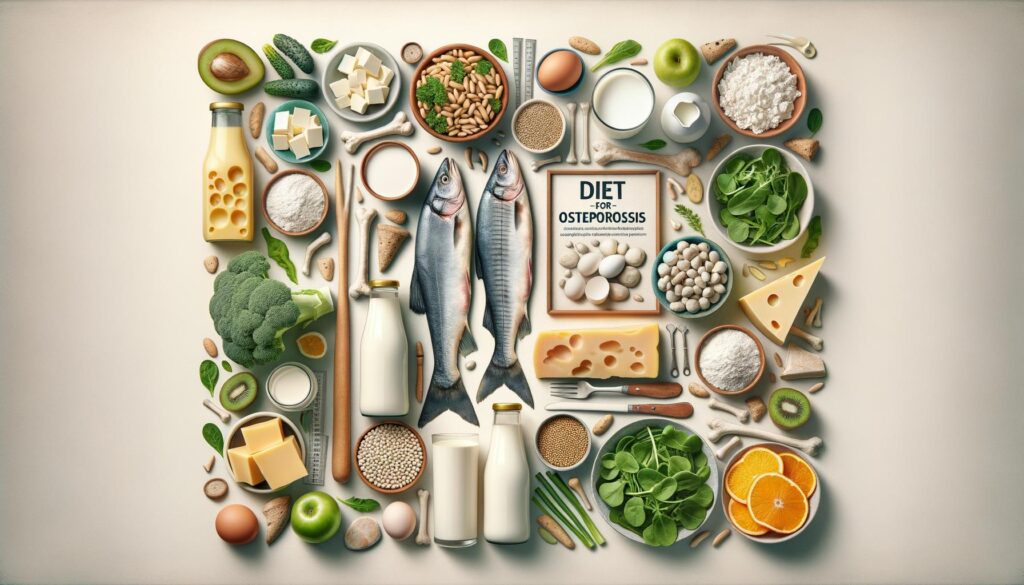Nourishing Your Bones: A Comprehensive Guide to Diet for Osteoporosis

Understanding Osteoporosis and Its Dietary Needs
Osteoporosis is a silent yet impactful condition that weakens bones over time, increasing the risk of fractures. One of the most effective ways to combat or manage osteoporosis is through dietary choices. The goal is to ensure that the bones receive adequate nutrition to maintain their strength and density. Key nutrients include calcium and vitamin D, which help to support bone growth and repair. Other important nutrients like magnesium, vitamin K, and protein also play critical roles in bone health. By focusing on a diet rich in these elements, individuals can work towards strengthening their bones and reducing the risk of osteoporosis-related complications.
Essential Nutrients for Bone Health
The cornerstone of a diet tailored for osteoporosis includes ensuring the appropriate intake of certain nutrients:
- Calcium: Dairy products, fortified plant milks, leafy greens, and almonds provide ample calcium, vital for bone strength.
- Vitamin D: Accessible through sunlight exposure and foods such as fatty fish or fortified cereals.
- Magnesium: Found in nuts, seeds, and whole grains, which aids in calcium absorption.
- Protein: Lean meats, beans, and legumes are essential for bone structure.
- Vitamin K: Green leafy vegetables such as spinach and kale support bone mineralization.
Incorporating a variety of these foods into daily meals can dramatically support bone health and slow progression of osteoporosis.
Foods to Include in Your Diet
Developing a habit of consuming a varied diet will provide not just strength for your bones, but bring about overall health benefits. Breakfast could include a bowl of fortified cereal with milk or a yogurt parfait layered with fruit and almonds. Lunchtime could center around a spinach and quinoa salad sprinkled with cheese for an additional calcium punch. Finally, dinner can feature oily fish such as salmon, accompanied by a serving of steamed broccoli or kale. These meal ideas not only enrich your diet with necessary nutrients but also offer versatility and flavor.
Foods and Habits to Avoid
While adding nourishing foods is essential, it is equally important to consider what to limit or avoid. Excessive consumption of salt, caffeine, and alcohol can negatively impact bone density. Salt can lead to calcium loss, caffeine in large quantities may interfere with calcium absorption, and alcohol can decrease bone formation. High intake of sugar-sweetened beverages may also pose a risk as they often contain phosphoric acid, which has a detrimental effect on bone health. Adopting a diet mindful of these factors can further support the management and prevention of osteoporosis.
The Role of Lifestyle Choices in Bone Health
Apart from dietary changes, incorporating physical activity and ensuring lifestyle modifications greatly influence bone health. Weight-bearing exercises such as walking, jogging, or dancing can enhance bone strength and coordination. Furthermore, quitting smoking and moderating alcohol consumption contribute to healthier bones. Regular bone density tests and consultations with healthcare providers to tailor the right nutritional plan are also recommended. Together with diet, these lifestyle choices create a holistic approach towards managing osteoporosis effectively.
Conclusion: Building Strong Foundations with Diet
Diet is a powerful tool in the fight against osteoporosis. By understanding the right nutrients, incorporating beneficial foods, and making informed lifestyle choices, individuals can significantly improve their bone health. It is vital to adopt these practices early to prevent the onset or progression of osteoporosis. Although changes may require some adjustment, the benefits of a robust skeletal system and overall well-being are invaluable.
